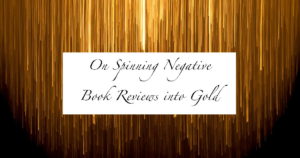
We all know that the more reviews a book receives, the better—whether reader responses on Goodreads, BookBub, or Amazon, or professional editorial reviews. But writer, beware: the more reviews pile up, the more likely it is that one or more of them will be bad. That’s statistically inevitable. There is no one book that everyone likes (except maybe Harry Potter). People’s tastes and expectations are too varied. You try to pitch your work to those who “like that kind of thing,” but it doesn’t always hold airtight. I’m sure we’ve all read lots of advice about letting bad reviews roll off our back, not taking the criticism personally, etc. I leave it to your therapist to deal with that side of the bad-critique syndrome. Instead, I’d like to offer some ideas for using those negative reviews to a good end. When the bad fairy gives you straw, spin it into gold!
Sock it to me
When you ask friends or colleagues for a beta reading, you expect them to catch problems, right? There’s a plot hole here. This question never gets answered. You’ve repeated this information several times. That’s far more useful than a blindly devoted, “Oh, this is wonderful!” (although, of course, it is). It gives you bite-sized and identifiable problems to work on in your next draft. The same thing can be said about a negative review that takes the time to identify what the reader didn’t like. Maybe one bad critique is a one-off matter of taste. But if there’s a pattern, better look closer.
Onward and Upward
Did they feel it was slow? Maybe that’s the kind of book you intended, not a thrill-a-minute adventure. So take the criticism with a small grain of salt… but also think of ways to tighten the next book. I’ve learned about my own books that I’m slow getting out of the blocks at the first, but after being told that more than once, I’ve made an effort to create faster starts. It has helped my writing.
Did they find the characters uninteresting? Maybe they simply weren’t a sympathetic reader, but it’s worth the time to examine your characterizations. Do they need more complexity? Are they stereotypes? Maybe the cure lies in adding some backstory, giving them a conflict of conscience, or high personal stakes. You’d never noticed it before, right? Because you knew those characters inside and out; to you they were supremely real and interesting. But maybe some of that wasn’t making it onto the page. Here’s a chance to enrich your next book.
Did they find the solution to the mystery was obvious from the very first? If you’re self-published, you can deal with this easily. Complicate the plot, trail a few red herrings, then republish. Even if you’re conventionally published, you have your marching orders for the next book.
Straw into gold
Now, nothing can be said for the one-star troll who doesn’t even bother to write a review (or leave their name). But an honest negative review can help us to deepen and polish our writing in a way that adulation can’t. Get past the pain and try to read their criticism objectively. Maybe your content editor liked your book, but ultimately it’s the opinion of readers that determines whether it sells or not. Such openness to criticism is what distinguishes a serious writer from a dilettante. Serious writers want to know how to improve their craft, no matter the cost. And letting the reviews fall where they will is a cheap way to gain insight.

Bill Morgenstein
Niki,
Thank you. My book, “The Crazy Life of a Kid From Brooklyn, has received 70 mostly 5 star reviews on Amazon, however two of the reviews received 1 star. What I discovered was one had never even read the book and the other didn’t like my political views. I didn’t attempt to remove them, however because I felt that having a few bad reviews gave the book credibility. I ask readers to review the book, but I don’t ask for a good one. (I had also discovered that Amazon did not publish almost 30 reviews because I think they [erceived the writers of the review to be close friend or relatives, which of course some were),
So, yes I agree with your comment that some poor reviews are inevitable. Thank you for the article.
Niki Kantzios
What doesn’t kill us makes us strong, eh! I agree about the credibility factor of bad reviews. If you check out even the mega-bestsellers, there are always a few people who didn’t like them at all.